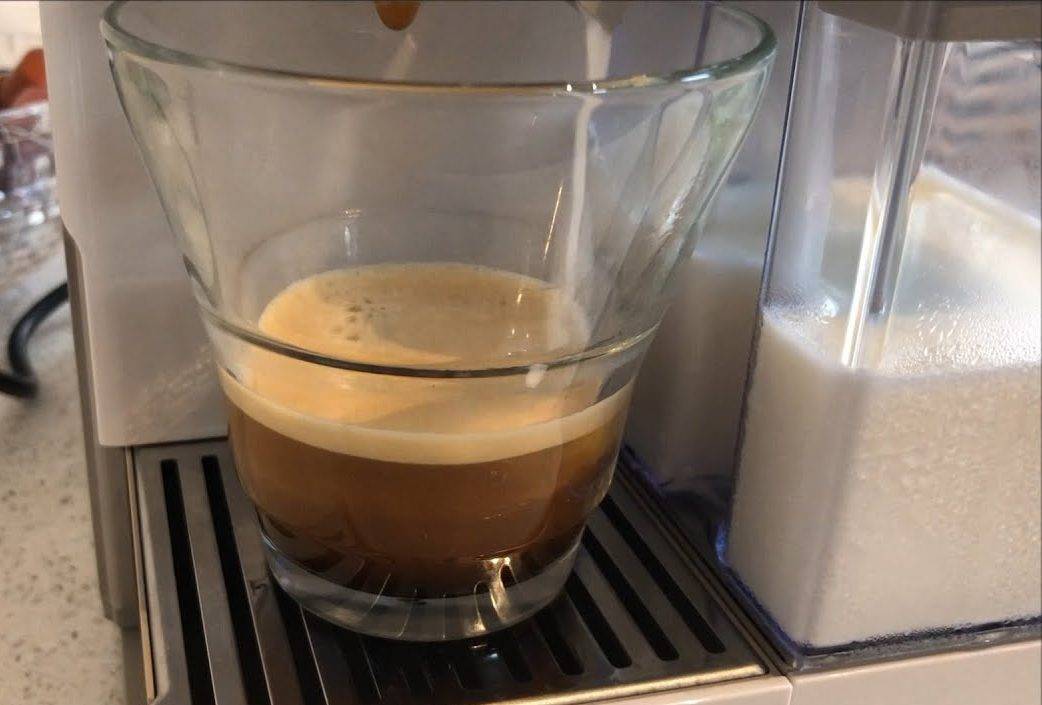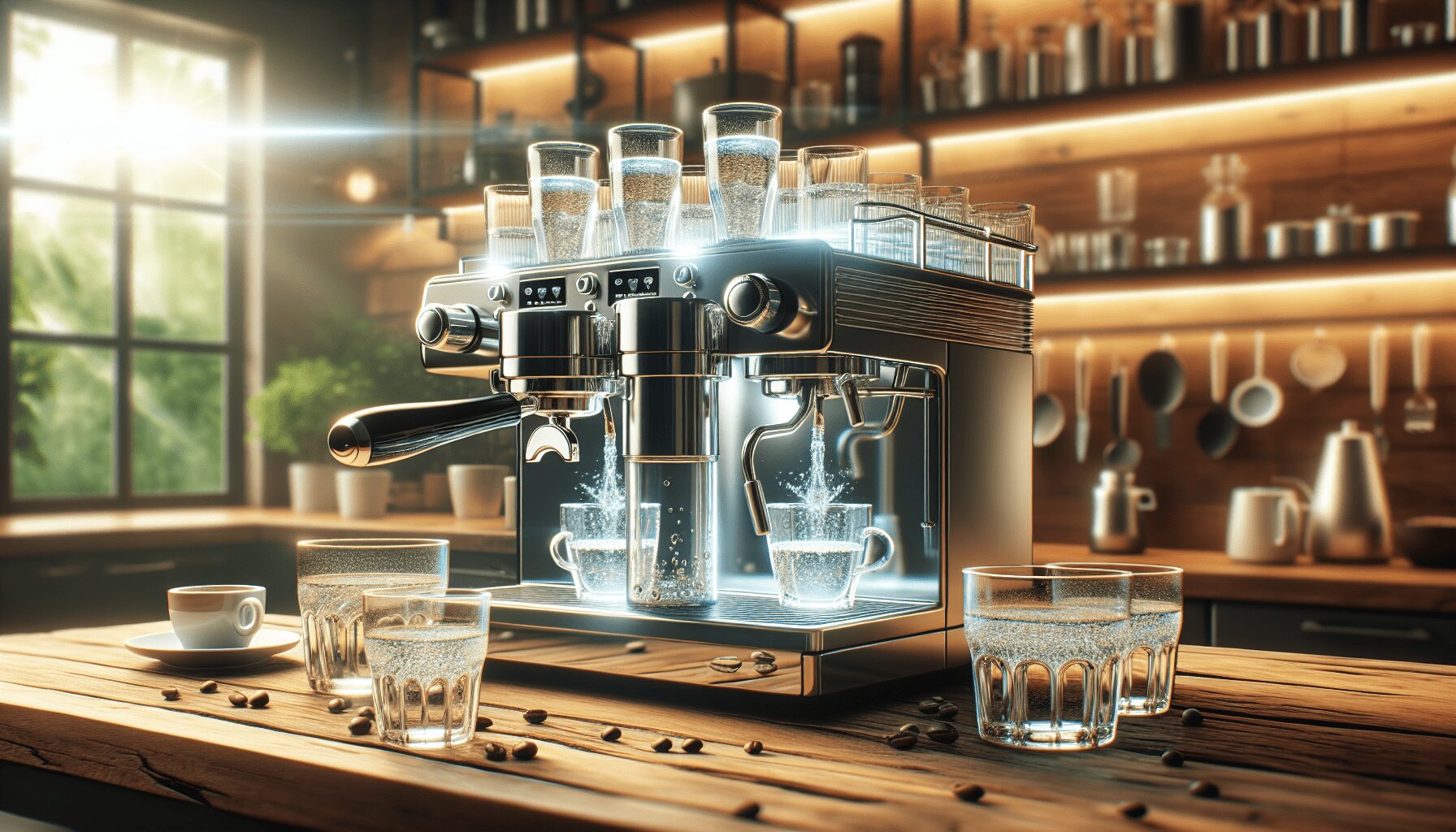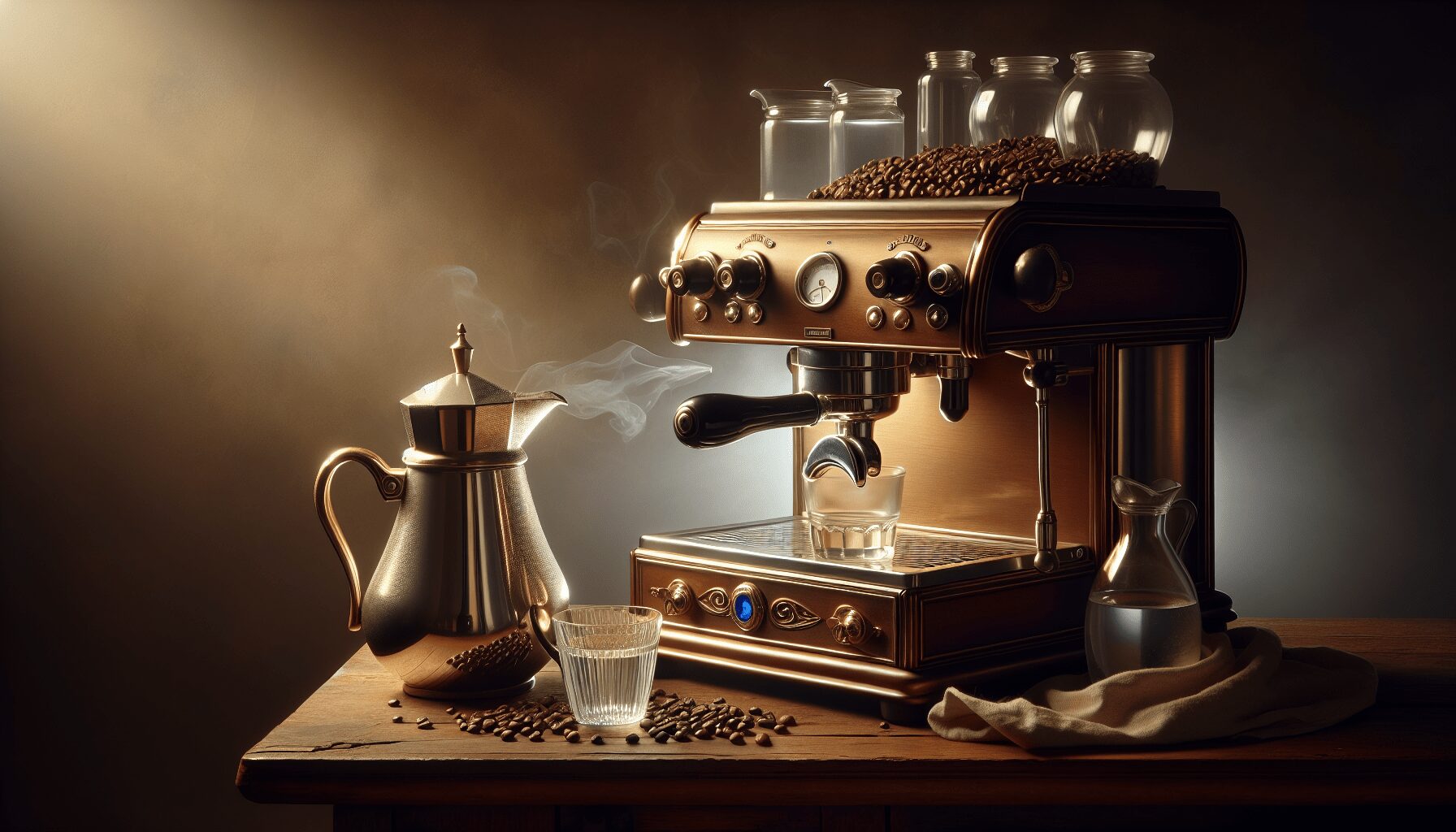Imagine waking up to the aroma of freshly brewed espresso, the rich flavors tantalizing your taste buds. But what if I told you that the key to the perfect cup lies not only in the type of coffee beans you use, but also in the water you pour into your espresso machine? That’s right, my friend, using distilled water in your espresso machine is essential for unlocking the full potential of your morning brew. In this article, we’ll explore why distilled water is the secret ingredient to achieving the perfect espresso, ensuring that every sip is a delightful, flavorful experience.
What is Distilled Water?
Definition
Distilled water is water that has been purified through the process of distillation. Distillation involves boiling water and then collecting the steam, which is then condensed back into liquid form. This process removes impurities, minerals, and contaminants, resulting in water that is pure and free from any substances.
Process of Distillation
The process of distillation begins by heating the water to its boiling point. As the water boils, the steam rises and is separated from the impurities and minerals present in the original water. This steam is then collected and cooled, causing it to condense back into liquid form. The resulting liquid is distilled water, which is now clean, pure, and free from any impurities.
Why is Distilled Water Important for Your Espresso Machine?
Prevents Mineral Build-up
One of the primary reasons why distilled water is crucial for your espresso machine is that it helps prevent mineral build-up. Tap water often contains various minerals, such as calcium and magnesium, which can accumulate over time and form scale deposits in the internal components of your machine. These scale deposits can clog the pipes and reduce the efficiency of your espresso machine. By using distilled water, which is devoid of minerals, you can prevent the formation of these deposits and ensure the smooth operation of your machine.
Maintains Optimal Flavor
The quality of water used in the brewing process plays a significant role in the taste of your espresso. Tap water may contain chlorine, sediment, or other impurities that can affect the flavor of your coffee. Distilled water, on the other hand, is free from these contaminants, providing a clean and pure base for your espresso. By using distilled water, you can ensure that the flavor of your espresso is not compromised by any unwanted tastes or odors.
Extends Lifespan of the Machine
Regularly using distilled water in your espresso machine can significantly extend its lifespan. The mineral build-up caused by tap water can lead to clogged pipes, reduced water flow, and decreased overall performance of the machine. Over time, this can result in the need for costly repairs or even the replacement of the entire machine. By using distilled water, you can reduce the risk of mineral build-up, thereby increasing the longevity of your espresso machine and saving yourself from unnecessary expenses.
Preventing Mineral Build-up
Minerals in Tap Water
Tap water often contains minerals such as calcium, magnesium, and iron. While these minerals are not harmful to consume, they can wreak havoc on your espresso machine. When tap water is heated, these minerals can precipitate out of the water and accumulate on the internal surfaces of your machine, leading to the formation of scale deposits.
Calcium and Scale Build-up
Calcium, in particular, is a common culprit in scale build-up. When calcium-rich water is heated, it can form limescale, a hard, chalky substance that can clog pipes, affect water flow, and damage internal components of your espresso machine. This scale build-up can negatively impact the performance and efficiency of your machine, resulting in a poor quality espresso and potential maintenance issues.
Effect on Espresso Machine
The mineral build-up caused by tap water can have various adverse effects on your espresso machine. Clogged pipes can lead to reduced water flow, resulting in slower brewing times and weaker espresso shots. The accumulation of scale deposits on heating elements can decrease their efficiency, leading to longer heating times and increased energy consumption. Overall, the mineral build-up from tap water can impair the performance of your espresso machine and diminish the quality of your coffee.
Maintaining Optimal Flavor
Impact of Water Quality on Flavor
Water quality plays a crucial role in determining the flavor of your espresso. Even the best quality coffee beans can be compromised if brewed with water that contains impurities. Tap water often contains chlorine, which can impart an unwanted taste to your coffee and mask its true flavors. Additionally, minerals present in tap water can interact with the compounds in coffee, altering its taste and aroma.
Distilled Water for Enhanced Taste
By using distilled water, you can ensure that the flavors and nuances of your coffee beans shine through in your espresso. Distilled water is free from chlorine and other impurities, allowing you to fully experience the natural flavors and aromas of your coffee. The result is a cleaner, more vibrant cup of espresso that truly showcases the characteristics of your chosen coffee beans.
Avoiding Unwanted Tastes
Using tap water that contains minerals or impurities can impart unwanted tastes to your espresso. These tastes can range from a subtle metallic flavor to a more pronounced bitterness or earthiness. Distilled water, on the other hand, provides a blank canvas for your coffee, allowing the true flavors to dominate without any interference from unwanted tastes or odors.
Extending Lifespan of the Machine
Mineral Build-up and Machine Performance
As mentioned earlier, mineral build-up can have a significant impact on the performance of your espresso machine. Scale deposits can clog pipes, reducing the water flow rate and causing your machine to work harder to produce a shot of espresso. This increased strain can lead to overheating, decreased efficiency, and potential damage to internal components.
Reducing Maintenance and Repairs
Regularly using distilled water in your espresso machine can significantly reduce the need for maintenance and repairs. By preventing the accumulation of scale deposits, you can avoid the costly process of descaling your machine, which typically involves using harsh chemicals or descaling solutions. Additionally, by maintaining a clean and scale-free machine, you minimize the risk of breakdowns and extend the time between professional servicing.
Longer Lifespan with Distilled Water
The use of distilled water as a preventive measure can extend the lifespan of your espresso machine. By minimizing the effects of mineral build-up, you ensure that your machine operates smoothly and efficiently for a more extended period. This not only saves you money but also allows you to enjoy delicious espresso from your machine for years to come.
Selecting the Right Water for Your Espresso Machine
Distilled Water vs. Tap Water
When choosing water for your espresso machine, distilled water is generally the recommended option. Tap water, as discussed earlier, can contain contaminants and minerals that can impact the flavor and performance of your machine. Distilled water, on the other hand, is purer and free from impurities, making it an ideal choice to maintain the integrity of your espresso.
Filtered Water as an Alternative
If distilled water is not readily available to you, using filtered water can be an acceptable alternative. Quality water filters can remove impurities and reduce the mineral content in tap water, improving its taste and suitability for your espresso machine. However, it is essential to choose a filter specifically designed for coffee applications and replace the filters regularly to ensure optimal water quality.
Considering Mineral Content
While distilled water is the preferred choice, some espresso enthusiasts argue that a minimal mineral content is desirable for the extraction and brewing process. Certain minerals in water, such as magnesium, are known to enhance the flavors of coffee. However, the optimal mineral content depends on various factors, including your specific coffee beans, personal taste preferences, and the ability to regularly clean and descale your machine. It is advised to experiment and find the right balance that works best for you.
Process of Using Distilled Water in an Espresso Machine
Proper Water Reservoir Cleaning
To begin using distilled water in your espresso machine, it is important to start with a clean water reservoir. Remove any remaining water or other liquids from the reservoir and rinse it thoroughly to remove any residue or impurities. Avoid using harsh chemicals that may leave a residue behind and impact the taste of your espresso. Once the reservoir is clean, you can fill it with distilled water.
Flushing the Machine
Before brewing your first shot of espresso with distilled water, it is recommended to flush the machine to remove any remaining residue or flavors from previous brews. Simply run a cycle of hot water through the machine, allowing it to flow through the brew head and group head to flush out any contaminants. This ensures that your first espresso shot with distilled water is clean and free from any unwanted tastes.
Regular Descaling
Even with the use of distilled water, some mineral build-up may still occur over time. It is essential to regularly descale your espresso machine to remove any scale deposits that may affect its performance. Descaling involves running a descaling solution or a vinegar-water solution through your machine to dissolve and remove the scale. Follow the instructions provided by your machine’s manufacturer for the recommended descaling frequency and process.
Other Considerations for Maintaining Your Espresso Machine
Proper Cleaning Practices
In addition to using distilled water and regular descaling, proper cleaning practices are crucial for maintaining your espresso machine. Regularly clean the brewing group, porta-filter, and steam wand after each use to remove any residual coffee grounds or milk residues. Use a soft brush or a clean cloth to scrub away any deposits, ensuring that these components are clean and ready for your next brewing session.
Regular Maintenance Checks
Regularly inspect your espresso machine for any signs of wear or damage. Check the gaskets, seals, and other components for any cracks, leaks, or deterioration. Keeping your machine in good working condition through regular maintenance checks can prevent minor issues from escalating into major problems and extend the lifespan of your espresso machine.
Using Quality Coffee Beans
While water quality is vital for a great tasting espresso, do not overlook the importance of using high-quality coffee beans. Select freshly roasted beans from reputable sources and grind them just before brewing for the best flavor and aroma. The combination of distilled water and quality coffee beans will deliver an outstanding cup of espresso that satisfies even the most discerning coffee lover.
Common Misconceptions about Distilled Water in Espresso Machines
Myth: Distilled Water is Too Pure
Some people believe that distilled water lacks essential minerals and nutrients, leading to a subpar espresso. While it is true that distilled water is devoid of minerals, it is essential to remember that the primary purpose of using distilled water in an espresso machine is to prevent mineral build-up and maintain optimal flavor. The minerals required for coffee extraction are already present in the coffee beans themselves, making additional minerals in water unnecessary.
Myth: Distilled Water Results in Tasteless Coffee
Another misconception is that using distilled water will result in bland or tasteless coffee. As discussed earlier, using distilled water actually allows the natural flavors and nuances of your coffee beans to shine through without any interference from unwanted tastes or odors. By using high-quality, freshly roasted coffee beans, you can create a rich and flavorful cup of espresso that is not affected by the use of distilled water.
Myth: Any Water is Suitable for an Espresso Machine
While it may be tempting to use any readily available water for your espresso machine, it is important to remember that water quality directly impacts the performance and taste of your espresso. Tap water, especially if high in mineral content, can lead to scale build-up, clogged pipes, and off-flavors in your coffee. Using distilled water or properly filtered water ensures that your espresso machine operates optimally and produces the best possible espresso.
Conclusion
The Benefits of Distilled Water
Using distilled water in your espresso machine offers numerous benefits. It helps prevent mineral build-up, maintains the optimal flavor of your espresso, and extends the lifespan of your machine. By removing impurities and minerals, distilled water provides a clean, pure base for brewing espresso, allowing the natural flavors of your coffee beans to shine through.
Taking Care of Your Espresso Machine
Proper maintenance of your espresso machine, including using distilled water, regular cleaning, and descaling, contributes to its longevity and performance. By adopting these practices and using quality coffee beans, you can enjoy the best possible espresso experience from your machine for years to come. So, invest in distilled water and take care of your espresso machine to savor the perfect cup of espresso every time.



